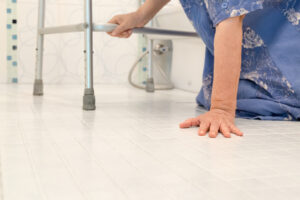There are many rights a nursing home resident has while living under the care and supervision of nursing home staff members along with the rights they hold as a citizen of the State of Illinois. Just because an individual requires assistance with some or all of their day to day tasks and have chosen to reside in a long-term care facility in Chicago does not mean they have given up any of their rights. If you or a loved one is currently living in a nursing home in Chicago, IL or intend on moving into one, we recommend that you read through the Illinois Nursing Home Care Act which outlines what a nursing home residents’ rights are.

Privacy vs. Isolation
When Leaving a Resident Alone for Too Long Becomes a Form of Neglect
When the family of an elderly individual has made the decision to move their loved one into a nursing home or the individual decided to relocate on their own, it doesn’t mean they are at the mercy of the facility and those that work there. When it comes to privacy and confidentiality, residents have the following rights:
- “You have a right to privacy and confidentiality of your personal and medical records. Your medical and personal care are private. Facility staff must respect your privacy when you are being examined or given care.”
- “Facility staff must knock before entering your room.”
- “You have the right to have private visits at the hour of your choosing if it does not impose on the rights of other residents.”
- “You may ask any visitor to leave your personal living area at any time.”
[Source: Illinois Department on Aging].
As important as it is for a nursing home residents’ privacy to be respected by staff, it is equally important that we understand the difference between respect of privacy and when a resident is being isolated and neglected. For example, leaving a resident left alone for a few minutes to chat with a visitor exemplifies respect of privacy. However, when a worker moves a nursing home resident into a room for several hours without tending to them or allowing them to interact with the other residents (i.e. isolating them), this could be considered a form of neglect.
Not only can isolating a resident on a continual basis cause him/her to suffer physically, but it can cause psychological damage as well.
Understanding the Damaging Effects of Continually Isolating a Nursing Home Resident
When a nursing home resident is isolated from others, there is a chance he/she isn’t receiving the care and attention they require from the staff. When a resident is isolated, they might also become disconnected from all others living in the facility which can have devastating effects on them. According to Julianne Holt-Lunstad, Ph.D., who is a professor of psychology and neuroscience at Brigham Young University, “Being connected to others socially is widely considered a fundamental human need—crucial to both well-being and survival” [Source: American Psychological Association (APA)].
Adults, both young and old, need social interaction. Without it, a person might develop feelings of loneliness which could potentially lead to them suffering from more serious health conditions.
While Ami Rokach, Ph.D., who is a clinical psychologist, says that loneliness is something “every single one of us deals with from time to time and can occur during life transitions such as the death of a loved one, a divorce, or a move to a new place, it isn’t something we should feel all the time. The reason being is that “loneliness can wreak havoc on an individual’s physical, mental and cognitive health.” The APA cites that there is “evidence linking perceived social isolation with adverse health consequences including depression, poor sleep quality, impaired executive function, accelerated cognitive decline, poor cardiovascular function and impaired immunity at every stage of life.”
In addition to causing feelings of loneliness to develop, isolation can also lead to a resident not getting the care they need. The reality is, healthcare workers are already overworked, and facilities are understaffed. When they leave a resident alone in their room to tend to others who may need more direct attention, they likely aren’t giving them the care and attention they need. This might include not bathing them regularly, feeding them at the appropriate time, administering medication when scheduled to do so, etc.
Leaving a resident in isolation also puts them at risk of getting hurt or falling as many will attempt to use the restroom or get out of bed on their own when there is no one around to assist them.
Now, if you think nursing home staff members are isolating your loved one from others which has resulted in his/her needs not being met, we recommend you contact Dinizulu Law Group, Ltd. to speak with a skilled Chicago, IL nursing home abuse lawyer. Our attorneys can provide you with the guidance and advice you might need right now if you aren’t sure as to what your next step should be. In the event you have a viable case, we are also available to provide your loved one with the legal representation they will need to seek the justice they deserve.
To speak with an experienced nursing home abuse lawyer in Chicago, IL now, give us a call at 1-312-384-1920.
You can contact Dinizulu Law Group, Ltd. at:
221 North La Salle Drive, Suite 1100
Chicago, IL 60601
Phone: 1-312-384-1920
Website: www.dinizululawgroup.com


